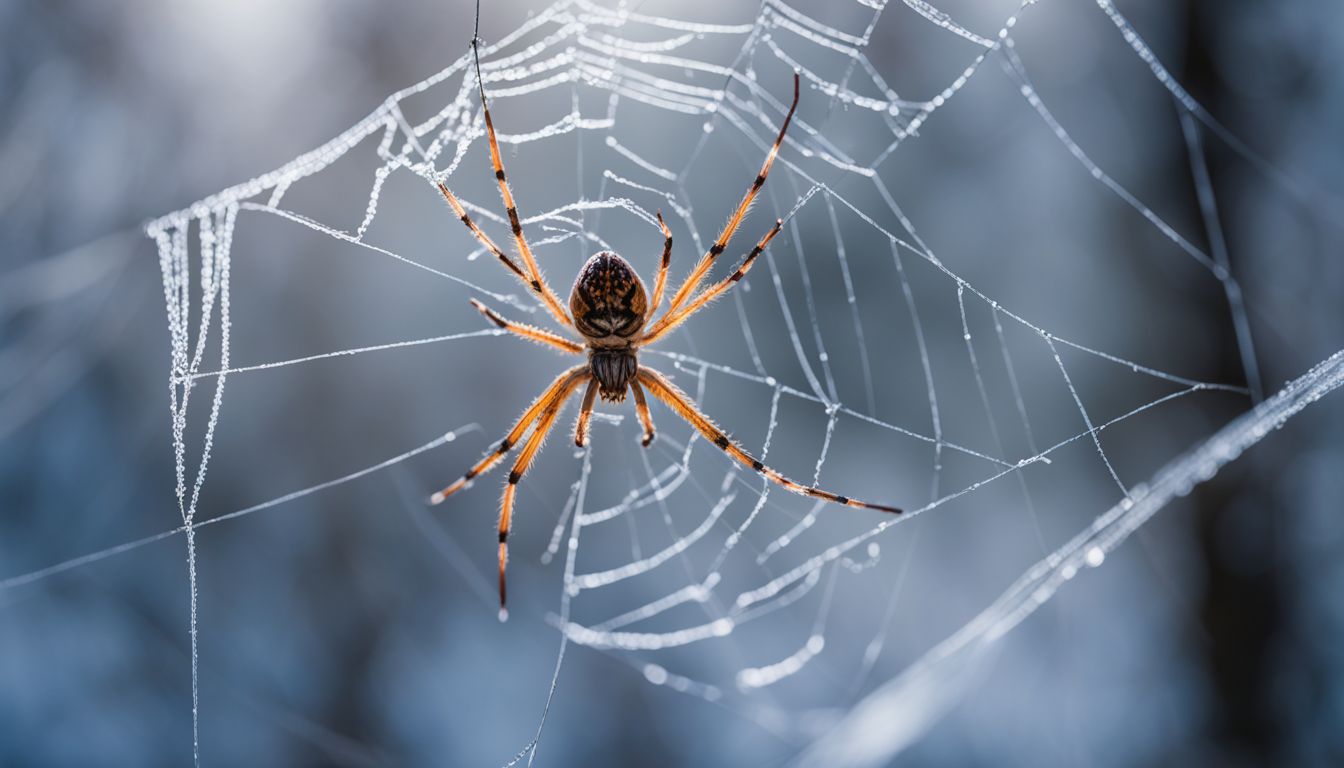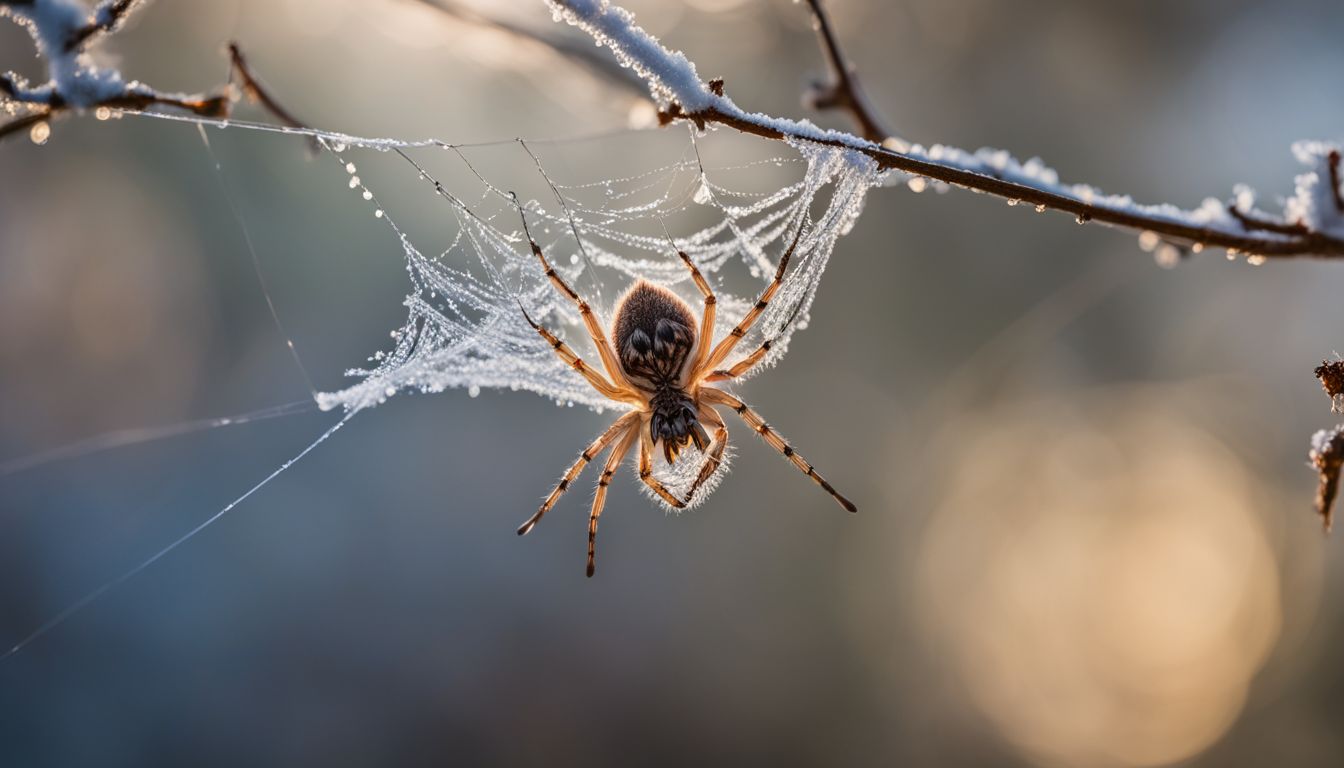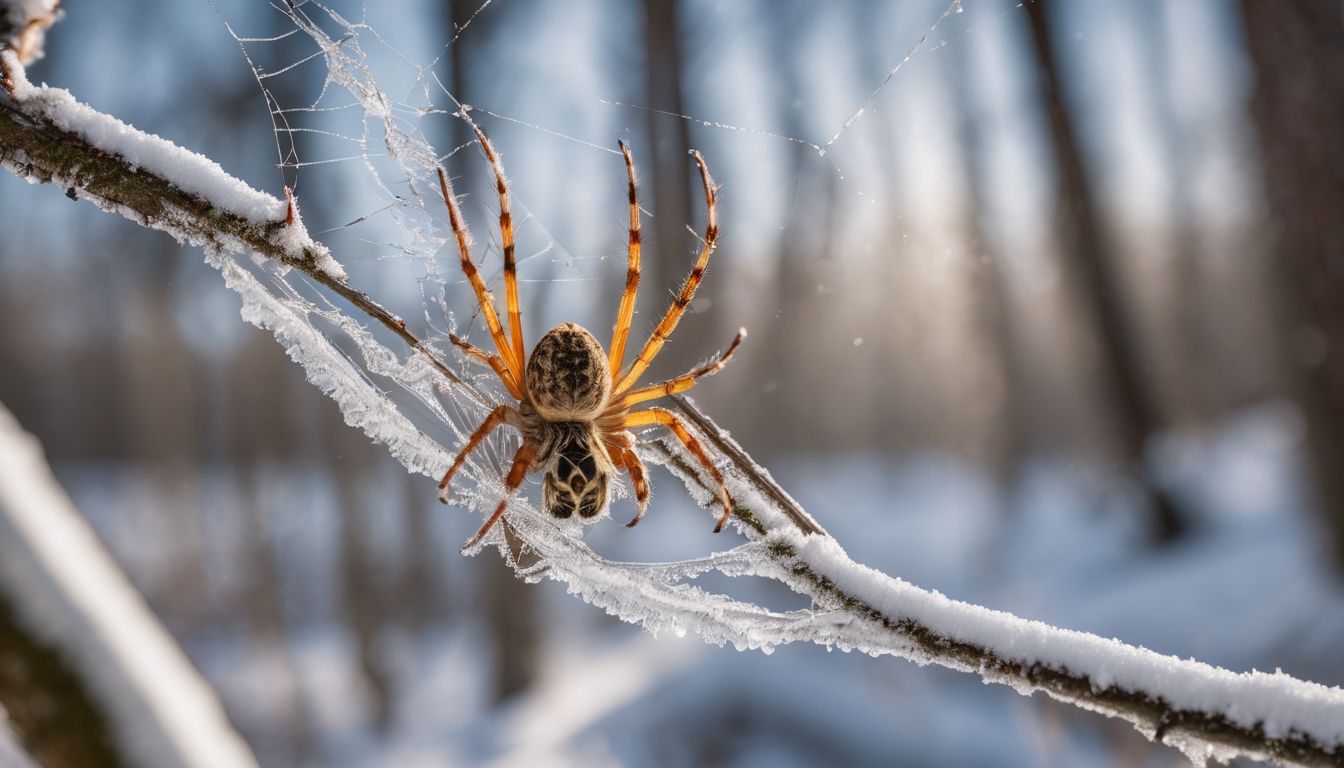As winter sets in, you might wonder where spiders go to escape the cold. While we bundle up, these eight-legged creatures have their own unique ways to survive frosty temperatures.
Our blog post will unravel the fascinating world of spiders in wintertime, shedding light on their survival strategies and debunking common myths. Discover how these tiny critters weather the winter months ahead!
Key Takeaways
- Spiders don’t hibernate in the winter, but they use survival tactics like producing antifreeze proteins and entering a state of diapause to endure the cold weather.
- Diapause is a period of slowed activity for spiders in response to colder temperatures, reducing their need for food and energy until warmer conditions return.
- Some common winter spider species have unique habits during colder months, such as seeking warm spots indoors or remaining active if food is available.
- Natural deterrents like citrus or peppermint essential oils can help keep spiders out of homes during winter, while professional pest control may be necessary if an infestation occurs.
Understanding Spider Survival Tactics in Cold Weather

Spiders use antifreeze proteins to survive in cold weather and also enter a state of diapause, a form of dormancy. These tactics allow them to lower their metabolism and conserve energy until the weather warms up again.
Use of Antifreeze Proteins
Some spiders make special proteins in their bodies to stop ice from forming inside them when it gets cold. These antifreeze proteins work like magic ingredients that let spiders live in freezing weather without turning into spider-sicles! Spiders with strong antifreeze powers can hang out in places where snow falls and temperatures drop a lot.
They stick around through winter because these proteins protect their tiny bodies from getting hurt by the cold.
Entering a State of Diapause
While spiders use antifreeze proteins to survive chilly temperatures, diapause takes their winter strategy a step further. This special state is like nature’s pause button for spiders.
Their bodies slow down so they don’t need much food or energy. They can stay like this until the weather gets warmer.
Spiders have found a cool way to deal with winter. They go into diapause and take it easy while it’s cold outside. It’s not a deep sleep, though; they’re just moving slowly and can still do things if they need to.
This helps them live through times when it would be too hard to find food or stay warm.
The Myth of Spider Hibernation

Spiders do not actually hibernate in the winter, but they have other survival tactics to endure the cold. They use antifreeze proteins and enter a state of diapause instead. Understanding these adaptations can help dispel the myth of spider hibernation.
Spiders’ Cold Weather Adaptations
In cold weather, spiders have special proteins that act like antifreeze. These proteins stop ice from forming in their bodies. This helps them stay alive even when it gets very chilly outside.
They also go into diapause where they slow down and don’t need as much food. Because the days are shorter and there’s not much to eat, this rest period is important for survival.
They can handle freezing temperatures without being hurt thanks to these cool tricks. Moving on, let’s explore why spiders don’t truly hibernate but rather enter a unique state of resting called diapause.
The Difference Between Diapause and True Hibernation
During colder months, spiders have survival tactics to endure the winter. Some species hibernate while others undergo diapause, which is a pause in their development as a response to environmental conditions.
Hibernation in mammals conserves energy, but for spiders, diapause occurs due to reduced temperatures and changes in food supply and daylight. While some spider species remain active during winter, others enter into a state of dormancy akin to hibernation called diapause.
Spiders exhibiting diapause experience a slowdown in their growth and metabolic activities rather than complete inactivity like true hibernation seen in some mammals. This allows them to conserve energy when resources are limited.
Common Winter Spider Species and Their Habits
The American House Spider, Brown Recluse, and Wolf Spider are some of the common spider species that exhibit unique winter habits. Each species has its own survival strategy to endure the cold weather.
The American House Spider
The American house spider is a common sight in homes, spinning messy webs in corners and crevices. These spiders are small, usually around 1/4 inch long, and have striped markings on their bodies.
They are not aggressive and rarely bite unless they feel threatened. Despite their presence indoors, they prefer to live outdoors where they can catch insects in their webs.
During winter, the American house spider doesn’t hibernate or move indoors due to cold weather but instead seeks out warm spots inside buildings for survival. However, using natural deterrents like sealing cracks and crevices can help keep these spiders at bay during winter months.
The Brown Recluse
The brown recluse spider is active during winter if it can find food. It prefers warm, dry, and dark places like woodpiles and basements. These spiders are tough enough to survive in unheated basements through winter and hot attics in summer.
Usually, they hibernate in the winter, unless they live indoors.
Bites from brown recluse spiders usually happen between March and October. Now let’s move on to learn about another common winter spider species: The Wolf Spider.
The Wolf Spider
Now, let’s step into the world of wolf spiders. Wolf spiders are large hunting spiders that stay active even in very cold temperatures, particularly in areas like Oklahoma and Pennsylvania.
They’re nocturnal creatures, exclusively hunting at night and spending most of their time on the ground but occasionally climbing up. The Hogna carolinensis and H. aspersa species found in Pennsylvania showcase these fascinating spider behaviors.
Managing Spiders in the Home During Winter
Keep spiders out of your home during winter by using natural deterrents like citrus or peppermint essential oils, and sealing any cracks or openings that could serve as entry points.
If the problem persists, consider seeking professional pest control to ensure a spider-free environment.
Natural Deterrents and Preventive Measures
Spiders can be deterred from homes using natural methods. Here are some ways to keep spiders away:
- Use citrus fruits, vinegar, peppermint oil, and cedar chips.
- Insecticide sprays can help deter spiders and other pests.
- There are several sprays available for controlling spiders around homes.
When to Consider Pest Control
During winter, it’s crucial to consider pest control if you notice an increase in spider activity indoors. Spiders often seek warmth and food sources inside homes during the cold season, making them more visible.
Brown recluse spiders, for example, are active during winter and might find their way inside. It’s important to address any signs of a potential infestation promptly.
Having understood when to consider pest control for spiders during winter, let’s now delve into managing spiders in the home with natural deterrents and preventive measures.
Conclusion
In the winter, spiders don’t hibernate like bears do. They can go through a phase called diapause when it’s cold. Spiders might find shelter and become less active during winter. It’s interesting how they survive during this time!
If you’re curious about the meaning behind those eerie spider dreams, especially after spotting one of these eight-legged guests in your home this winter, explore our insights on dreams about spiders attacking.
FAQs
1. Do spiders sleep all winter?
Some spiders, like house spiders and tarantulas, find a safe spot in places like a crawl space to stay still and cold since they can’t control their body temperature like we do.
2. What happens to baby spiders in the winter?
Baby spiders, called spiderlings, may hatch from egg sacs and stay inside them where it’s warm until spring comes.
3. Can black widow and jumping spiders bite you in winter?
Even if it’s cold outside, black widow and jumping spiders can still bite if they feel scared or bothered because they sometimes come indoors to get away from the cold.
4. Do all types of spiders live through the winter?
Not every spider makes it through the cold months. For example, fiddleback spider adults might not survive but their eggs tucked away in egg sacks can make it till spring.
5. How do I stop bugs that are not spiders from coming inside my home during winter?
To keep pests like carpet beetles, bed bugs, mites, and mosquitoes out of your home during winter when searching for warmth; seal cracks around doors and windowsills or consider calling an extermination expert for help.




